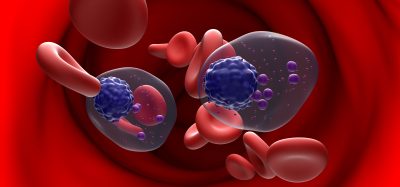Targeted oral treatments for severe asthma
Posted: 22 January 2019 | Iqra Farooq (Drug Target Review) | No comments yet
Researchers are aiming to identify whether antibiotics could be used to treat severe asthma in place of steroids which often have unwanted side effects…


Researchers in Leicester are leading a study to investigate the use of antibiotics in the treatment of cancer.
The researchers in this project, funded by a collaboration between the National Institute for Health Research (NIHR) and Medical Research Council (MRC), are also working with Asthma UK.
Around 1 in 20 people have severe asthma – where, despite regular medication, the condition presents itself through poor lung function and a high number of other symptoms. Those affected by the condition have frequent attacks, and are often admitted into hospital.
Professor Salman Siddiqui, at the University of Leicester, was the Chief Investigator of the study, and is a Consultant Respiratory Physician at Leicester’s Hospitals.
“In this study we will work with severe asthma specialist centres in the UK to identify patients who experience frequent asthma attacks, which we define as two or more per year,” he said.
“We will then take a blood test that measures blood eosinophil level (a type of blood cell associated with inflammation) to identify two important subtypes of severe asthma. The first subtype of interest to us is called “T2-HIGH” severe asthma and might be driven by high numbers of eosinophils in the blood that then move to the airways in the lungs and may cause asthma attacks. The second subtype is called “T2-LOW” severe asthma and might be caused by bacteria living in the lungs and how they work with the immune cells. Depending on which type of severe asthma patients have, they will be split into two arms of the study.”
Professor of Respiratory Medicine at the University of Nottingham, Honorary Consultant at Nottingham University Hospitals NHS Trust and the T2-LOW trial national co-ordinator, Dr Dominick Shaw said: “Once we have identified patients in the T2-LOW subtype group we will test whether a simple, once daily, oral antibiotic called doxycycline can reduce asthma attacks by changing the bacteria present in the lungs. This work will help to identify the right patients to give “long-term” antibiotics to, and to see whether the bacteria that live in the lungs might be responsible for causing asthma attacks in people with T2-LOW severe asthma.
“Knowing which patients are the right ones to receive antibiotics is important, as bacterial resistance to antibiotics through inappropriate use is a recognised global problem. Also, if we find out that targeting certain bacteria that live in the lung reduces asthma attacks, this could pave the way for future trials evaluating other types of intervention, such as probiotics.”
Prof Siddiqui mentioned: “The patients in the T2-HIGH subtype will test a new oral tablet called dexpramipexole, which lowers the number of eosinophils in the blood by stopping them growing in the person’s bone marrow (the part of the body that produces new blood cells).
“We want to see if this treatment will be effective in reducing asthma attacks in patients with the T2-HIGH subtype of severe asthma. This work has the potential to provide an alternative option to oral steroids or biologic injections for this patient group.”
Val Hudson, the patient representative for the trial supported the recruitment of suitable patients with severe asthma, and said: “When you are involved as a patient in a clinical trial, both as a member of a patient input platform or as a trial participant, you are aware that you are not likely to personally benefit from the trial results but you hope that you will make a difference to people in the future with severe asthma.
“For me personally this trial is important because I am on very large doses of corticosteroids but they still do not stop me having asthma attacks, which are becoming more frequent, and require more oral steroids in response. Oral steroids are ‘life savers’ in emergency situations but in themselves can cause as many problems as they solve – like osteoporosis.
“A major issue with current asthma treatment is that it tries to tackle everything because no one has detected the type of severe asthma a person may have. This is what is so exciting about this trial; to discover the exact type of severe asthma and target treatment accordingly. It would be so much simpler if someone like me had treatment based on the exact cause and was able to respond to a small dose of antibiotics or a biological treatment that reduced the number of asthma attacks and thus the need for oral steroids.”
Dr Samantha Walker, the Director of Research and Policy at Asthma UK, and a co-applicant for the study, said:“We are really excited to be involved in this ground-breaking study which has the potential to identify new treatments for thousands of people suffering from severe asthma.
“This debilitating form of [the condition] is often resistant to regular treatments leaving people to deal with terrifying asthma attacks, repeated trips to A&E and often admission to hospital. Many people with severe asthma are currently dependent on long-term, high-dose oral steroids, which can cause toxic side effects such as diabetes or osteoporosis as well as sleep disturbance, weight gain and cataracts.
“Asthma UK has over 15 years’ experience in involving people with [the condition] in research which has helped shape and drive the design and delivery of studies. It is vital that people with [the condition] are involved at all stages of research as they provide invaluable insight into their experiences and ensure that studies have the biggest possible impact.”
Related topics
Disease Research, Research & Development, Screening, Therapeutics
Related conditions
Asthma
Related organisations
Asthma UK, Leicester University, Medical Research Council, National Institute for Health Research
Related people
Dr Samantha Walker, Professor Dominick Shaw, Professor Salman Siddiqui, Val Hudson








